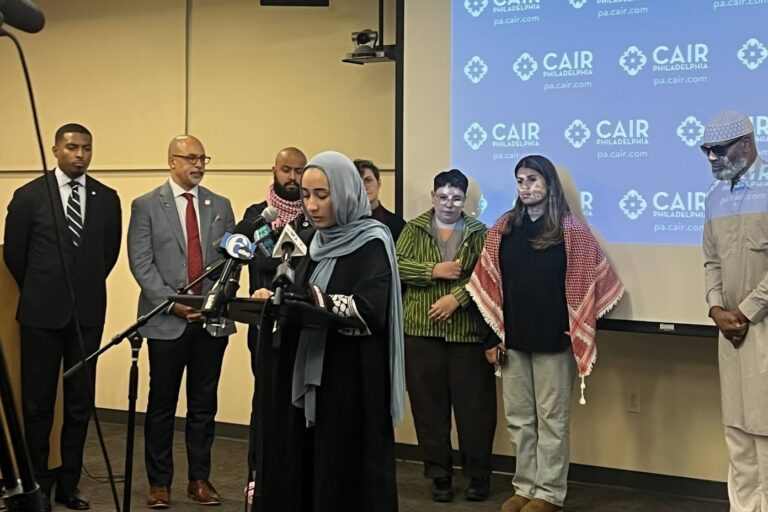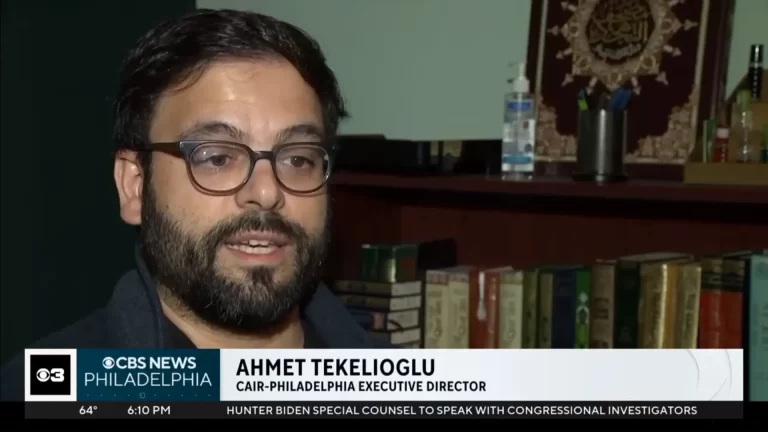![]()
by Kathy Matheson
NPR, September 10, 2010
BERWYN, Pa. — A new mosque recently opened in this well-to-do suburb of Philadelphia, but not many people noticed.
That was fine with leaders of the Islamic Society of Greater Valley Forge. Amid a tense national climate for U.S. Muslims, they did not seek publicity for the happy occasion, only continued peace with their neighbors: a Jewish synagogue next door and Baptist church across the street.
The Muslims’ good relations with other faiths and the town at large offers a stark contrast to American communities torn by anti-Islamic acts, including arson at the site of a planned mosque in Tennessee and a threatened Quran burning in Florida.
In New York, debate rages over a planned Islamic center and mosque near ground zero. And everywhere tensions are heightened because Friday’s joyous Muslim celebration of Eid al-Fitr falls a day before the somber ninth anniversary of 9/11.
But in Tredyffrin Township, about 20 miles northwest of Philadelphia, community members say a tradition of religious tolerance, combined with an educated population and small-town friendliness, have yielded years of harmonious coexistence.
“We have much more in common than not in common,” mosque president Mohammad Aziz said. “We are blessed with very good neighbors.”
Township officials conceded some trepidation among residents when the Islamic Society sought construction permits in 2008. The growing Sunni group planned to build on land behind the small house it had used as a mosque since 1994.
Most concerns were standard zoning issues like parking, traffic and stormwater runoff. But the concept of a mosque was jarring to some, despite Muslims having long worshipped at the site, said Judy DiFilippo, a township supervisor for 20 years until her retirement in January.
“It was something brand new to the community. Even though they were using an existing building, it wasn’t an obvious mosque,” DiFilippo said.
The plans were approved; construction and fundraising began in earnest, capped by the mosque opening on June 5. DiFilippo said there have been no problems, which she attributed to an “underlying theme of tolerance that just comes with this community.”
Yossi Kaplan, a Lubavitch rabbi at Chabad Jewish Center next door, said he was approached by people seeking his opposition to the project — but waved them off. The two faiths were enjoying solid relations, to the point where they shared parking lots and Muslims helped with tasks that Jews cannot perform on the Sabbath.
The rabbi expected nothing less from his neighbors, regardless of religion. This is America, Kaplan said, and this is how it’s supposed to be.
“We’re just good friends. We’re really good neighbors,” he said. “There’s never been any issues.”
The United States has seen a 58 percent increase in the number of mosques over the past decade, from 1,200 to roughly 1,900, according to Ihsan Bagby, a professor of Islamic studies at the University of Kentucky and a researcher on American mosques.
Yet many U.S. mosques are repurposed existing buildings, retrofitted to accommodate ritual washing areas and separate entrances for men and women. Sometimes they require odd configurations for prayer so worshippers can face Mecca.
Thus the new $1.5 million mosque in Tredyffrin is truly an American Dream for Aziz. Since joining the congregation in 1998, he said, it has more than doubled in size as technology professionals arrived in the area from India and Pakistan.
The mosque has a prayer hall, library, multipurpose room, bathrooms with washing areas, WiFi and — most important — more space for the 60 or so families who worship there.
Except for dome-shaped accents around the vertical windows, it looks more like a community center than a house of worship. There are no minarets and no dome — cost-conscious omissions that Aziz said should help it blend in and attract younger generations.
“American mosques should take their own form … (and) be appealing and open to people, not just Muslims,” said Aziz, 57. “It is built for my children and my children’s children.”
Last week, the Pennsylvania chapter of the Council on American-Islamic Relations sponsored an event for community members to tour the mosque, learn about the faith, observe evening prayers and share dinner.
“If you get to know your neighbors, you are less inclined to be fearful of them,” CAIR-PA Executive Director Moein Khawaja said.
About 50 people came, including the Rev. John Loring, pastor of the Baptist Church in the Great Valley, just across the street. The congregation was founded in 1711 by Welsh immigrants seeking freedom to worship in Pennsylvania, then a colony that emphasized its welcome to settlers of all faiths.
“Respect for all religions is an important part of who we are,” Loring said.
Sally Bovais, 68, of Phoenixville, came with about 10 members of her nearby Presbyterian church. She said such events were important “to put a face to Muslim people.”
“The stereotype is really very dangerous,” Bovais said. “They espouse love and peace, and raise families and are involved in their faith. That’s part of the thread of our nation.”





